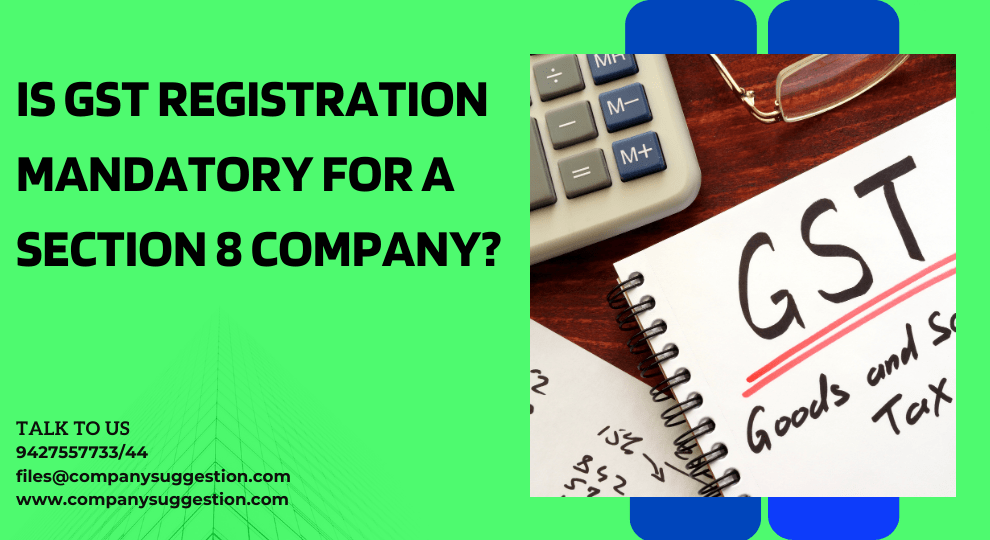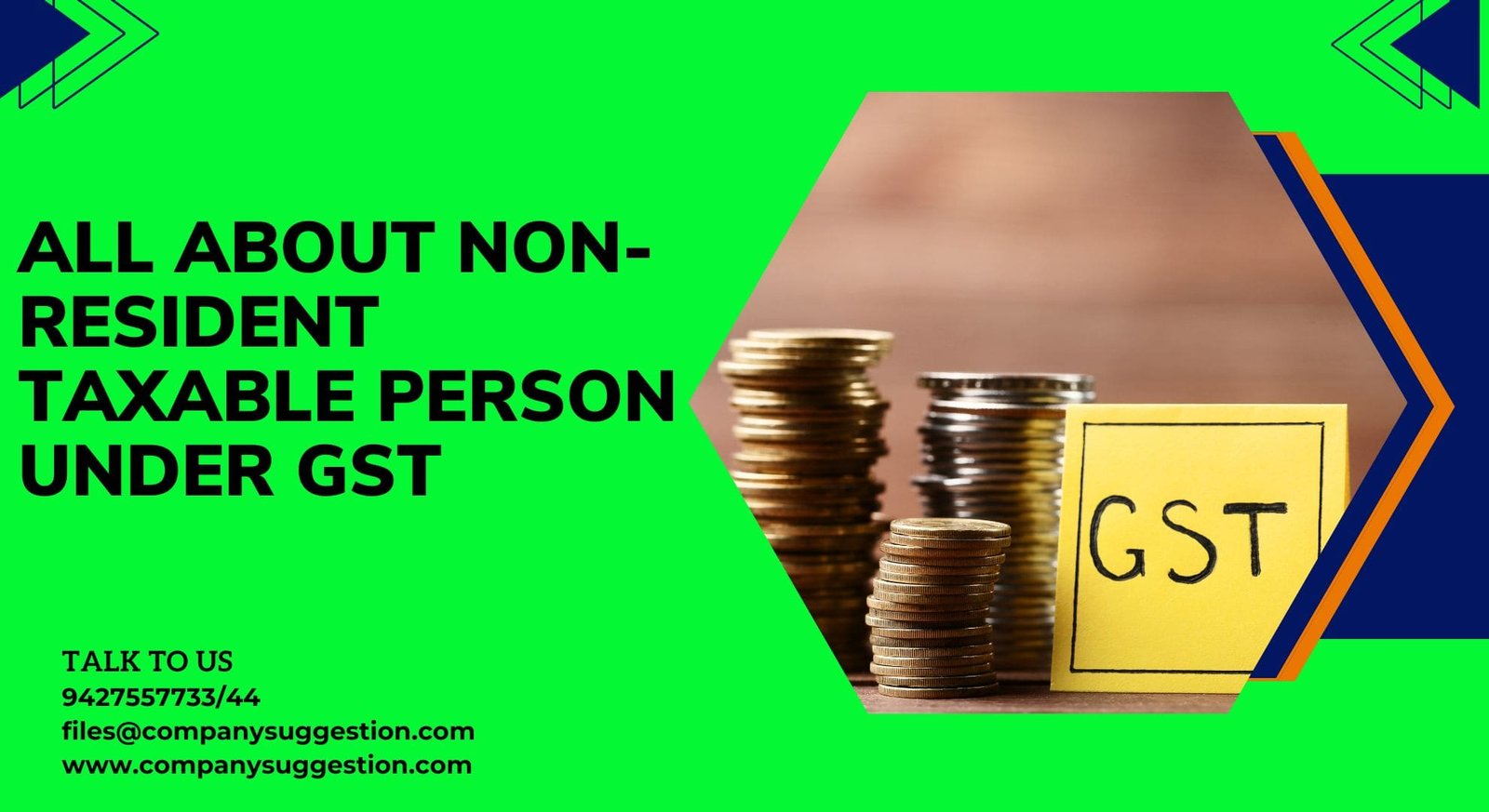A Section 8 company is established primarily to advance non-profit goals encompassing areas like business, art, charity, education, religion, environment protection, social welfare, sports, and research. The incorporation of a Section 8 Company mandates the involvement of at least two directors. Furthermore, there’s no specific requirement for a minimum paid-up capital for such companies. Non-profit entities in India have the option to either get registered with the Registrar of Societies or get incorporated as a non-profit corporation under Section 8 of the 2013 Company Act. Any potential profits generated by this type of company are channeled towards advancing its objectives rather than distributing dividends among shareholders. In the earlier Companies Act of 1956, a Section 8 Company was equivalent to a Section 25 Company. To reflect this change, the corresponding section in the 2013 Companies Act has been updated to Section 8. In this piece, we will delve into the process of GST Registration for a Section 8 Company.
GST Registration for Section 8 Company
If a Section 8 Company needs to follow the GST rules, it must register for GST. Some companies help with registering both the company and GST for Section 8 organizations. This service usually costs between ₹10,000 to ₹25,000. Registering a Section 8 company is more expensive compared to a similar organization like a trust. This is because a Section 8 company needs special approval from the Central Government and has extra requirements.
Regarding Section 8 company GST registration, it’s important to understand that if a Section 8 Company is subject to the GST Act, it must register with GST. Several companies in the market provide services for both company registration and GST registration for Section 8 companies. The cost ranges from ₹10,000 to ₹25,000. Registration for a Section 8 company is more costly than a similar type of organisation, for example, a trust. The reason being a Section 8 company requires approval from the Central Government and fulfill many other additional requirements.
Benefits Of GST Registration For Section 8 Company
Donor Benefits:
Sections 80G and 12 of the Income Tax Act originating in 1926 grant the privilege of tax exemption to any contributions received from a Section 8 entity.
Limited Member Liability:
Individuals involved with a Section 8 corporation enjoy restricted liability concerning the shares they’ve subscribed to, as they are not held accountable for any losses incurred by the firm.
Favorable Tax Implications:
Section 8 companies reap tax benefits outlined in Section 80G of the Income Tax Act of 1956, as they are excluded from adhering to CARO (Company Auditor’s Report Order).
Unrestricted Capital Management:
Section 8 enterprises have the flexibility to modify their capital arrangement as they deem appropriate, as there is no mandatory initial capital requirement during establishment.
Exemption from Stamp Duty:
The obligatory stamp duty applicable to the Memorandum of Association (MOA) is waived for Section 8 corporations.
Eligibility For Incorporation Of Section 8 Companies
Here are the eligibility criteria that must be met by Section 8 companies:
- Either an individual or a Hindu Undivided Family (HUF).
- A minimum of two individuals are required to serve as directors, and they must ensure full compliance with the company’s obligations.
- It is mandatory for at least one of the directors to be a resident of India.
- The company’s incorporation should be exclusively for purposes such as charitable activities, education, sports advancement, research, religious pursuits, social welfare, and environmental conservation.
- The company is prohibited from directly or indirectly distributing its profits to shareholders and members of the board of directors.
- The founders, board members, and company associates are not allowed to receive compensation either in the form of cash or non-monetary benefits.
Essential Documentation for GST Registration of a Section 8 Company
Below are the necessary documents for GST Registration of a Section 8 Company:
- Incorporation Date of the Company
- PAN Card of the Society/Trust/NGO
- Passport-sized Photos and PAN Card of the Promoter/Partners
- Contact Particulars (comprising postal address, website, physical address, and phone number)
- Business Registration Number (BRN) of the Company
- Identification Number of the Business (INN)
- Comprehensive list of business activities undertaken by the organization
- Objectives and aspirations of the company’s mission
- Annual revenue generated by the business
- Compilation of prior business activities conducted by the organization
Impact of GST on Section 8 companies
The Goods and Services Tax (GST) Act has a dual impact on Section 8 companies:
As Suppliers of Goods and Services
A ‘taxable individual as per the GST Act’ refers to ‘any entity involved in conducting business activities within India and holds registration or is mandated to be registered under the GST Act. A taxable individual is someone who participates in economic undertakings like trade and business.
This category encompasses individuals, Hindu Undivided Families (HUFs), companies, partnerships, Limited Liability Partnerships (LLPs), Associations of Persons (AOPs) or Bodies of Individuals (BOIs), both domestic and foreign corporations, cooperative societies, local authorities, governmental bodies, trusts, and artificial legal entities.
However, while trusts, societies, or Section 8 companies are included in the GST taxable person definition, they are excluded if they aren’t engaged in economic pursuits such as trade and commerce. Nevertheless, a ruling from Maharashtra’s GST Authority of Advanced Ruling (AAR) has established that non-profit organizations offering goods and services for a fee are subject to GST.
The judgement further specifies that if a charitable organization’s yearly turnover from selling goods and services surpasses ₹20 lakh, it must obtain GST registration. Consequently, a non-profit entity selling items like stationary or honey must get GST registration if the earnings from these sales exceed ₹20 lakhs in any fiscal year. Similarly, a non-profit providing a service like digital literacy classes for young women is also obligated under GST.
Essentially, this indicates that even if a charitable entity, GST will be applicable to their goods or services if the revenue generated from such supplies crosses ₹20 lakhs in a financial year. The responsibility of paying the GST falls on the consumer. However, it increases the non-profit’s financial accounting and regulatory expenditures.
As the Consumers of Goods and Services
Non-profit organizations that are registered under Section 12A or 12AA of the Income Tax Act of 1961 might be acknowledged by the Income Tax Department as being exempt from direct taxes. However, this exemption specifically applies to the income they generate and is not applicable to indirect taxes such as the GST. If such an organization operates from a commercial office space, it cannot use its 12A or 12AA certification to claim GST exemption on the rent paid to the landlord.
Likewise, the so-called “tax-free” status of non-profits (in relation to direct taxes) does not provide any immunity from GST when procuring items like computers, laptops, tablets, or a vehicle for their charitable activities. Non-profit entities are liable to pay GST on any products or services they acquire. In essence, a non-profit is treated just like a regular consumer or client when dealing with suppliers of goods and services.
Conclusion
This article outlines the various regulations related to Goods and Services Tax (GST) that impact organizations operating under the provisions of Section 8 within the Companies Act of 2013. These entities have significantly contributed to the betterment of society, with their primary objective being the advancement of nonprofit causes such as trade, charity, education, sports, research, religion, social welfare, and environmental conservation. It’s important to note that Section 8 companies fall under the definition of a taxable entity as per GST laws. It’s recommended to seek professional guidance when pursuing GST registration for a Section 8 company. For further information, you can also explore Companysuggestion.com













